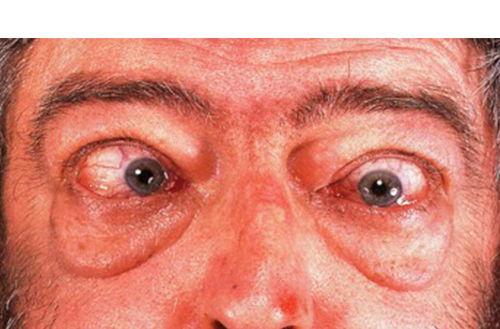Thyroid Eye Disease Specialist
NeuroEyeOrbit Institute
Swaraj Bose, MD
Neuro-Ophthalmologist & Orbital Surgeon located in Cedars Sinai Medical Towers, Los Angeles, CA
As a top neuro-ophthalmologist serving patients in Beverly Hills, CA, and throughout the Greater Los Angeles area, Dr. Bose is skilled in the diagnosis and management of eye diseases and vision problems associated with thyroid disease.
Thyroid Eye Disease Q & A

What is thyroid eye disease?
Also called Graves' disease, thyroid eye disease is a condition that occurs when the immune system malfunctions, causing it to attack healthy tissues including the thyroid gland. In response, the gland produces excess amounts of hormones, causing a condition called hyperthyroidism or overactive thyroid. Because the connective tissues of the eyes are similar to those in the thyroid, the immune system also often attacks these tissues, causing a wide array of symptoms. Although they're caused by the same autoimmune disorder, Graves' disease and associated eye problems must be treated separately. Women and smokers both have an increased risk of developing thyroid eye disease.
What are the symptoms of thyroid-related eye disease?
Signs and symptoms of eye disease related to thyroid malfunction include:
swelling around the eyes and eyelids
lid retraction
dry eyes or a “gritty” feeling in the eyes
optic nerve damage
sensitivity to light
sores or ulcers in the cornea
double vision
red, watery eyes
pressure sensation in the eyes
Loss of vision can also occur in about 10 percent to 20 percent of patients. Many symptoms occur as a result of inflammation and scarring caused by the immune system's repeated attacks on the eye muscles and connective tissues.
How is thyroid eye disease treated?
Treatment begins by addressing the active symptoms to prevent vision loss and heal damage to the eye structures. Treatment can include artificial tears, eye ointments, oral medications and prescription eye drops. In a few cases, radiation may be used to address some symptoms. In some cases, it may take months or even two to three years for active symptoms to resolve. During that time, regular monitoring by an ophthalmologist is essential. Once active symptoms have been addressed, surgery may be required to address permanent damage, and ongoing management is essential.
More information on Thyroid Eye Disease here.
Major Insurance Providers Accepted
_____________________________________
For questions regarding your specific insurance plan, please contact the office.
_____________________________________



















